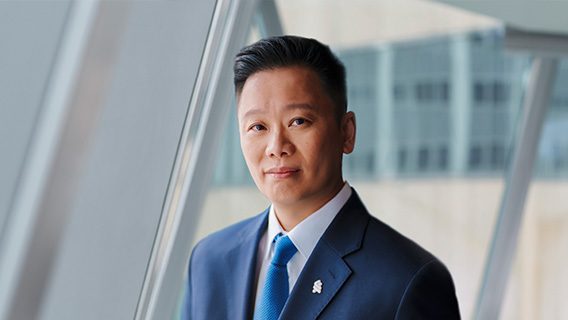AI and the next generation of family wealth
Our research reveals that families who use AI in their decision-making achieve more desirable wealth management outcomes.

Insights from more than 300 ultra-high-net-worth (UHNW) individuals and family office professionals indicate that advanced technologies such as artificial intelligence (AI) are delivering tangible performance benefits to families as they work to manage and grow their wealth.
Trust in AI supports wealth management satisfaction
The research finds that UHNW families who trust AI in their decision-making are more likely than average to be satisfied with their family office’s wealth management performance.
Beyond current performance, there is a strong link between digital maturity and longer-term strategic resilience. Families within the study that place trust in AI to support their decisions are more confident in their family office’s ability to adapt to an evolving global landscape
Human input is improving AI trust and adoption
The human expertise of next-generation (next-gen) family members and family office professionals is a driving force behind trust in AI tools. Almost three in four UHNW families surveyed say that next-gen voices directly influence their wealth decisions.
The research also highlights that advanced technology, particularly AI, is a priority for younger family members. Millennials and Generation X individuals are almost 20 percentage points more likely than Baby Boomers and the Silent Generation to identify advanced technologies as a medium-term concern for wealth. Moreover, next-gen family members are more likely than heads of family to express trust in AI tools, suggesting a broader mindset shift in how technology can support the growth and stewardship of family wealth.
The research’s qualitative interviews highlight that younger generations are keen to go beyond their family office’s routine IT maintenance reviews. “Our annual review process is more focused on current tools than renewing our approach,” says a Generation X successor with a Dubai-headquartered family office. “We are missing productivity improvements and investment opportunities. If nothing significant has changed by the time I take the chair, this will be on my top three list.”
74%
of next-gen family members trust AI to make wealth management decisions if humans are involved, compared with 66% of senior family members.
The overall confidence expressed in the research is contingent on human judgement being layered on AI input, especially when it comes to important decisions. To use AI responsibly in wealth management, family offices must secure access to talent that can safeguard data integrity and monitor outputs.
“Our two recent analyst appointments to the family office are tech-driven,” says a Generation X successor with a Singapore-based family office. “Some of the AI developments are going to be incredibly useful in areas such as managing risk, sourcing investments and conducting due diligence. I can see huge upside potential in returns for the portfolio.”

“In an increasingly unpredictable world, the architecture of wealth management must evolve to build resilience, unlock opportunities, and protect legacies. By using AI in wealth management decisions, families can begin to move beyond reactivity and plan for change. In doing so, they are embedding relevance and longevity for generations to come.”
—Raymond Ang, Global Head of Private Bank and Affluent Clients and Head of Wealth and Retail Banking, Greater China and North Asia, Standard Chartered.
AI is elevating family office performance
The research reveals clear patterns showing that, with well-managed human oversight, family offices are improving their services by harnessing AI.
Sharper analytics
Family offices are leveraging AI to generate market intelligence, identify emerging trends and stress-test portfolios against a range of economic and political scenarios. This enables faster and more informed decision-making – an important capability in today’s volatile operating environment.
Capital allocation
AI also represents a compelling domain for capital allocation. “AI is transformative,” says the CEO of a Hong Kong-based family office. “Its major impact for us lies in accelerating and improving our investment qualification and decision-making processes. Our tech-related portfolio is now outperforming the rest of our investment base by some margin.”
UHNW families who lean on AI for decisions are more likely to have the confidence to capitalise on digital assets.
Back-office productivity
Behind the scenes, family offices are using AI to streamline due diligence and know-your-client (KYC) checks, automate contract creation and legal reviews, and strengthen cybersecurity protocols. These defensive applications are particularly critical at a time when investment scams targeting wealthy individuals are on the rise.
“Our defensive walls are big users of technology, including AI tools,” says one Millennial successor with a Hong Kong-headquartered family office. “We have multilayered protection in place and have never experienced a breach of any kind.”
Tech maturity = resilience
As UHNW families and family offices continue to explore how AI can be used to enhance growth, it is equally important to establish robust governance processes to ensure responsible use.
There are four key considerations to keep in mind:
- AI can enhance human judgement, but should not replace skilled financial experts
- Prioritise data credibility to ensure reliable output
- Test, test and retest tools in line with ongoing market and technological advance
- Invest in expertise to build and maintain secure, effective systems
This article is produced in collaboration with FT Longitude, the specialist research and content marketing division of the Financial Times Group.
You may also like

The hidden dividend of giving
Philanthropy is strengthening family values, bridging generations and guiding legacy decisions.

Cross-border pressures on wealth
Global footprints are redefining how UHNW families protect and structure their wealth.